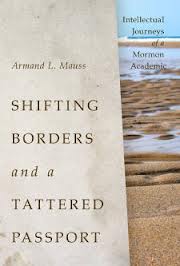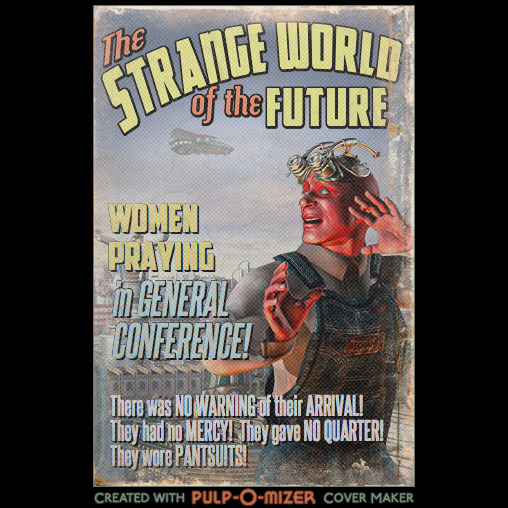-
•
•
35 responses
My previous post centered on the special place religious institutions have historically held in human society. I argued that since religions couldn’t reliably provide public, objectively observable miracles or verify any of their claims about an afterlife, the only plausible explanation for their social capital was their ability to bridge the gap between deeply rooted human longing for meaning and the world’s absurdity. Suppose we fix that as our definition of religion. Any belief system (with accompanying formal and informal social institutions) that attempts to aid us in our quest for meaning is a religion. The interesting thing about such… Read More
-
•
•
6 responses
The formal organization of the Church on April 6, 1830, subject of Gospel Doctrine lesson #9 this year, was the culmination of many preparatory steps that Joseph Smith and his fellow believers took. When the organization occurred, the group had new scripture, new authority from God and a new prophet at its head. In the ensuing years it added other key elements to its structure, beliefs and practices, some of which are described below in John Hardy’s hymn. In a real sense, at least most of these elements are what we are talking about when we speak of the restoration… Read More
-
•
•
6 responses
A stunning amount of what I think is wrong with the world is poetically captured in a recent article in First Things, commenting on the relationship between faith and reason on the one hand, and Christianity and Islam on the other. Unfortunately, the author captures these problems unintentionally. The difference between his perspective and mine is both fascinating and discouraging. Hope remains, however, so hang on . . . In his article, “Benedict Face to Face with Islam,” Andrew Doran portrays Pope Benedict XVI as a rational Christian who has the (supposed) insight to see Islam as irrational, and who… Read More
-
•
•
54 responses
Is it possible to be a jerk for Jesus? If someone believes that God’s laws prohibit women from wearing pants to church, should they physically threaten those women? Is that an act of righteous reprimand and belief, or as a very serious overstep? If an internet writer vigorously responds to harsh attacks from critics of the church, but these responses are often laced with incredibly foul misogyny, should other church members support or distance themselves from those remarks? What makes Mormons — normally among the nicest people on the planet — suddenly feel compelled to lash out with as much… Read More
-
•
•
91 responses
Over at Worlds Without End, Seth posted Overcoming Correlation, or Mormon Studies and Pastoral Care. Why do we keep talking about Correlation? Obviously, there’s something wrong, but there are various opinions as to what exactly that is and how one might go about fixing it. After recounting his own scholarly engagement with Mormon Studies, Seth offers a couple of conclusions about Correlation, its problems, and how Mormon Studies might help solve them. Read More
-
•
•
26 responses
I’ve been observing Lent for a few years now. And every year I run into consternation from other latter day Saints. Every year I’m told “Mormons don’t observe Lent.”Last year I reflected on this at the end of Lent. I fast as a Mormon, but that doesn’t mean I can’t take advantage of the period of Lent. I pray as a Mormon, do the scripture reading and contemplative thinking that we class as meditation, but I also practice yoga for its meditative and mind-clearing effects as well as the physical benefits. I actively seek out good faith practices developed by… Read More
-
•
•
16 responses

If we think of orality and literacy not as a binary opposition but as encompassing a broad spectrum of attitudes toward and uses of the spoken and written word, then we might find that Lehi and Nephi stand on opposite sides of a fundamental shift. Read More
-
•
•
“Beyond the Mormon Moment: Directions for Mormon Studies in the New Century” A Conference in Honor of the Career of Armand Mauss March 15-16, 2013 Read More
-
•
•
68 responses

Secularism is a new religion that threatens to overwhelm traditional faiths in much the same way that Christianity and Manichaeism swept away traditional local cults almost two thousand years ago. Mormonism is far from immune to this process, but it is particularly well-suited (theologically) to adapt (culturally) and remain relevant and vibrant. If changes are made. The ship must be turned to face the wave head-on. Since secularism is defined in opposition to religion, either I don’t understand what religion is or the secularists that I have in mind don’t understand what religion is. I’ll argue why it is the latter.… Read More
-
•
•
The restoration of the priesthood, outlined in the D&C Gospel Doctrine lesson #8, is central to the Church’s claim to authority and to our understanding of the course of the plan of salvation. Following the atonement of Christ, the authority to administer the ordinances required for eternal life must be a very important element of the plan and central to the preparation for the millennium, at least in the view of the author of this poem, John Hardy. Read More
-
•
•
43 responses

I am almost done with the recently published memoir by Armand Mauss, Shifting Borders and a Tattered Passport: Intellectual Journeys of a Mormon Academic (U of U Press, 2012; publisher’s page). Like Leonard Arrington’s earlier memoir, Adventures of a Church Historian, the book is something of a insider’s guided tour of fifty years of Mormon Studies, including the two important books on Mormonism authored by Mauss, The Angel and the Beehive (1994) and All Abraham’s Children (2003). Anyone who reads T&S or the other blog will certainly enjoy the tour. Read More
-
•
•
When Lorenzo Snow speaks of the Holy Ghost in the material included in chapter 4 of the lesson book, it is clear that he sees the spirit as a great help to us. “It would be simply foolish indeed to expect the Latter-day Saints in these days to comply with the celestial law… except they were sustained by a supernatural power.” The idea that there is a power in the Holy Ghost is something that isn’t mentioned often. So when I saw the following poem, it resonated with me. Read More
-
•
•
When discussing the first principles and ordinances of the gospel the focus is often on the details and less often on their purpose in the plan of salvation. The 7th D&C gospel doctrine lesson talks about faith, repentance, baptism and the gift of the holy ghost. In teaching these principles and ordinances, the focus should remain on Christ. Read More
-
•
•
14 responses
Me to husband: “Stake conference this weekend.” Read More
-
•
•
27 responses
It was one of those fragile, vulnerable Sundays again. I’m like that sometimes, going through church shaking like a leaf, on the edge of my composure. It’s a kind of weakness, to always be close to tears, like to be overcome at any moment. I’m not sure why some Sundays hit me that way. Perhaps I haven’t eaten enough. Or I may be experiencing some hormonal fluctuation. Or perhaps the expectation of the day is too much for me. I need to go, to work, to be spiritually uplifted, to edify others. I need to do my paperwork, contribute thoughtful… Read More
-
•
•
25 responses
For several years now, the Mormon Archipelago aggregator site (which used to be found here) has served as a relatively complete listing of LDS blogs and also provided real-time feeds listing recent posts. It has been something of an anchor for the Bloggernacle. It was handy to see new posts at larger blogs all in one place. MA also pushed traffic to a lot of smaller blogs that otherwise wouldn’t get too many visitors. But MA has been down for over a week now and it’s not clear if or when it will be back. What is to be done?… Read More
-
•
•
7 responses
I want to understand one thing especially. All my work bends to it. I want to understand the contraction of religious belief as a positive religious phenomenon. Read More
-
•
•
11 responses

My dear friend, Read More
-
•
•
What Mormon art projects are drawing attention? Does the Mormon community donate to worthy projects? What Mormon projects attract Mormons? Off and on I’ve been looking at Kickstarter, the crowd-funding website for artists of all kinds who are looking for seed money to get their projects completed. I’ve even funded a project and I’m looking forward to the results of my small contribution. When Kickstarter launched a few years ago it drew a lot of press because it promised to make raising money for small projects easier. A number of similar sites that have launched, and it looks like some… Read More
-
•
•
23 responses
In “How to Make Our Ideas Clear,” Charles Peirce argues that belief just is whatever it does. Read More
-
•
•
105 responses
The decision may come today. Will the Boy Scouts of America allow gay leaders and youth to participate in their program? I have gay relatives, friends, neighbors, and acquaintances. Some of them are great. Some I love. Some I’d rather not spend much time with because I find them annoying. After all, they are real people, just like my hetero relatives, friends, neighbors, and acquaintances, some of whom are great, loveable and/or annoying. Although not a scout as a child, I am part of BSA now. I even have a uniform to wear. And I desperately want to share the… Read More
-
•
•
7 responses
Our stake president has challenged all members of our stake to have a “missionary moment” this year. I never served a mission and I don’t like doing overtly missionary-type activities. But his challenge did bring to mind one of the most important missionary experiences I have ever had. It was more than a decade ago. I was a young housewife living in one of the graduate and family student housing complexes at UCSD while my husband was doing his graduate work. I had a toddler and I was expecting our second baby. One day a couple of strangers knocked on… Read More
-
•
•
10 responses
This is one of the teaching outlines from the new youth Sunday School curriculum for February. I thought I’d share how I plan to teach this lesson. Read More
-
•
•
9 responses
It’s a big day today—100 years ago, on February 3, 1913, Delaware ratified the 16th Amendment, meaning it had been ratified by the necessary 36 states. And, with the ratification of the 16th Amendment, the U.S. could constitutionally impose an income tax. Read More
-
•
•
2 responses
The concept of enduring to the end can be somewhat vague. Much of what it requires depends on environment and circumstance — what is required for you to endure to the end is perhaps different than what will be required of me. But the underlying gospel principles are known, and the following poem by Eliza R. Snow talks about some of them. Read More
-
•
•
The principle of personal revelation is a foundation of Mormonism, a key to our understanding of the gospel. And few places in the scriptures make this as clear as in D&C 8 and 9, which are discussed in Gospel Doctrine lesson 6. There we learn, among other things, that faith is a key aspect of personal revelation. Thus to receive personal revelation, we need to remember the Lord, as is described in the poem I selected for this lesson. Read More
-
•
•
5 responses

It’s always fun to read computer/science/tech magazines from the 80’s, and see just how far things have come in 30 years, and what predictions were way off. Even more so from the 1950s. Sometimes the things they herald as bizarre and never-going-to-happen have come to be so taken for granted that I can seem really old for talking about VCRs, and having to look in the newspaper to find out movie times. It strikes me that such is also the case with the Church, in some ways. But really, I just wanted to post the below image, made with The… Read More
-
•
•
Our sisters and brothers in the bloggernacle have turned their virtual relationship into doing tangible good for those in need. Yesterday, Lisa at fMH announced the Tracy McKay fMh Scholarship. I remember last year when Tracy’s ward financial assistance was cut and the immediate action by her fellow bloggers to raise enough money to get her through her last semester. fMh is working on an endowment to make the scholarship permanent and contributions tax-deductible. (Last year, we just gave money because it was needed, it was the right thing to do, and that mattered more than a tax deduction.) In… Read More
-
•
•
42 responses
The following appeared in a ward bulletin this past week. It was forwarded to me by a friend. Edited only to remove identifying information. [The friend noted: the person who wrote it is new and feels very inadequate and would probably feel horrified to know it was being discussed in the public sphere. But, well, it needs to be.] Thursday, February 14 at 6:30 pm the Relief Society is hosting a Couples Dinner and Fireside. Come enjoy a nice evening with your spouse and gain some insight on how to strengthen your marriage. We will have dinner and babysitting in… Read More
-
•
•
11 responses
[This is the fourth in a series of guest posts on Mental Health, Mortal Life, and Accountability. The first three installments are available here: Part 1:”Exceeding Sorrowful, Even Unto Death” (Mark 14:34), Part 2: Causes and (Mis)Attributions, Part 3: Fractured Images of God, Self, and Others, and Part 4: Accommodations in LDS Activities and Meetings] Now knowing a portion of my background, you can probably guess I’ve had opportunity to give a fair amount of consideration to the concepts of personal responsibility, repentance, and forgiveness. Please take this post as exactly that, my own considerations on these topics, long thought out, studied, prayed about,… Read More
